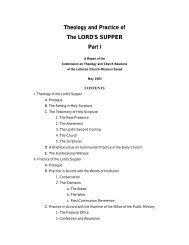March 2013 - St. Paul's Lutheran Church of Kingsville, MD
March 2013 - St. Paul's Lutheran Church of Kingsville, MD
March 2013 - St. Paul's Lutheran Church of Kingsville, MD
Create successful ePaper yourself
Turn your PDF publications into a flip-book with our unique Google optimized e-Paper software.
Les Misérables: The Most <strong>Lutheran</strong> Movie Ever?<br />
by Rev. Peter Jonas<br />
At first glance, anointing Les Misérables as a <strong>Lutheran</strong> movie may seem kind <strong>of</strong> silly. Victor<br />
Hugo, the author <strong>of</strong> the novel the movie is based on, was raised a French Catholic and later<br />
became an anti-clerical skeptic. The movie is set in 18th century France. Historically there<br />
probably wasn’t a <strong>Lutheran</strong> closer to 200 miles from where the action takes place. Yet it is<br />
remarkable how the themes and characters <strong>of</strong> the movie illustrate the heart <strong>of</strong> <strong>Lutheran</strong><br />
theology.<br />
SPOILER ALERT: If you have not seen the movie and do not want to know any details <strong>of</strong><br />
the plot before going, it would be best to stop reading here.<br />
The main character <strong>of</strong> the movie is Jean Valjean [portrayed by Hugh Jackman]—a man who<br />
has been imprisoned for seven years for the crime <strong>of</strong> stealing a loaf <strong>of</strong> bread to feed his<br />
starving family. At the beginning <strong>of</strong> the movie, a desperate Jean Valjean steals the silver service <strong>of</strong> a godly bishop who has<br />
taken him in. The police capture him and bring him to the bishop. Amazingly, the bishop covers for Valjean by saying the silver<br />
was a gift and then goes on to give him his silver candle sticks. At this point Valjean commits himself to living a life dedicated<br />
to God and helping others. But he must break the conditions <strong>of</strong> his parole in order to embark on this new life and claim a<br />
new identity.<br />
This scene exemplifies grace. Valjean receives new life and a second chance as undeserved gift, not because he deserves it, or<br />
even because he has repented <strong>of</strong> his faults, but out <strong>of</strong> sheer mercy and grace. As the Gospel <strong>of</strong> John says, “From Christ’s fullness<br />
we have received grace upon grace.”<br />
The two major characters <strong>of</strong> the movie are Valjean and a police captain named Javert [played by Russell Crowe]. After his<br />
narrow escape from the law, Valjean does go on to fulfill his vows, successfully building a factory that employs many people<br />
and becoming the mayor <strong>of</strong> his city under an assumed name. Javert relentlessly pursues Valjean for breaking his parole and at<br />
long last discovers his identity. Javert’s life revolves around the “letter <strong>of</strong> the law.” [Javert sings that] the law, like the beautiful<br />
stars in the sky, is what is necessary to navigate through this sinful life.<br />
<strong>Lutheran</strong>s have always stressed the importance <strong>of</strong> both law and gospel in interpreting scripture. The law serves primarily to<br />
convict us <strong>of</strong> our sin, thus paving the way for recognizing that we need salvation. But it also creates a foundation for a just and<br />
civil society. The gospel <strong>of</strong> Jesus Christ is what saves humans and frees us for truly good works.<br />
Valjean and Javert embody the tension between law and gospel. <strong>Lutheran</strong>s believe that ultimately, in the light <strong>of</strong> the gospel,<br />
the demands and the accusations <strong>of</strong> the law “must die” and a forgiven sinner “dies to the law.” Because Valjean has [violated]<br />
his parole, Javert sees him as a plain criminal. There is no room in Javert’s black and white world for Valjean’s good works or<br />
the mitigating circumstances surrounding his “crimes.” Through a strange chain <strong>of</strong> events, Valjean actually has the opportunity<br />
to kill Javert and chooses to spare his life. Javert cannot bear to be in the debt <strong>of</strong> a criminal. His universe based on the “letter<br />
<strong>of</strong> the law” is shattered. Finally Javert commits suicide. Javert’s suicide is an ominous fulfillment <strong>of</strong> 2 Corinthians 3:6, “The<br />
letter kills but the Spirit gives life.”<br />
Space does not permit an analysis <strong>of</strong> the many other Christian themes that pervade the movie version <strong>of</strong> Les Misérables. But<br />
the two themes we have examined—the beautiful depiction <strong>of</strong> unmerited grace and the tension between law and gospel certainly<br />
resonate with the heart <strong>of</strong> <strong>Lutheran</strong> thinking about the Christian gospel.<br />
Source: Rev. Jonas is pastor <strong>of</strong> Christ <strong>Lutheran</strong> <strong>Church</strong> (ELCA), Arcadia, WI. Pastor Jonas’ review <strong>of</strong> Les Misérables is reprinted<br />
from the February <strong>2013</strong> edition <strong>of</strong> Christ Line, Christ <strong>Lutheran</strong>’s monthly newsletter. Les Misérables will be available<br />
on DVD and Blu-ray this month.<br />
<strong>March</strong> <strong>2013</strong><br />
Page 13



